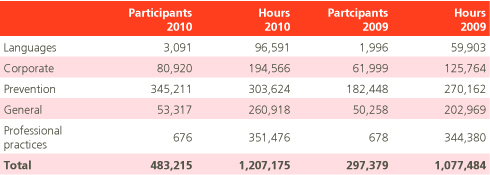 Abengoa
Abengoa
Annual Report 2010
- Corporate Social Responsibility Report
- Abengoa and its people
- Training and Developing Human Capital
The Importance of Training in Human Resource Policy
Abengoa, convinced that companies raise their level of excellence through employee training and development to thereby increase opportunities, success, and market recognition, is deeply committed to personnel instruction and updating. Proof of this is the fact that the company devoted more than 1,2 M hours to training in 2010.
Abengoa’s Training Strategy: Existing Methodologies and Management Model
Abengoa’s approach to training is a product of the key objectives in accordance with the strategic plan that has been drawn up for successfully meeting these objectives. Based on these objectives, general training requirements are determined for the company, as well as Abengoa’s annual training plan, which gives rise to specific training programs for each company.
Company training combines a variety of instruction methodologies: attendance-based, semi-attendance-based, and online, among others.
Training Content Areas
Abengoa’s training plan encompasses all contents required for maintaining a team of highly qualified professionals in alignment with corporate culture. Noteworthy, among others, are the following areas:
- Corporate training, which transmits corporate culture; company values and principles, and management system. It also covers key aspects of company strategy; understanding of risks and business, and the vision of leadership.
- General training, aimed at employees’ professional enhancement in any discipline related to their position, mission, function, and duties.
- Training in occupational risk prevention, based on health and safety standards in the workplace and the use of protective elements.
- Languages, as a key component in Abengoa’s model of ongoing international growth.
- Professional practices, carried out through the company’s grant program.
Professional Programs
The professional programs are an important part of the Abengoa training model and are designed to reinforce strategic competencies and advance professional careers within the company:
-
Project director program, enabling professionals to access best practices and the latest pertinent theoretical material. Program contents and themes are based on Abengoa’s internal procedures. This program has served to train numerous professionals in Europe, Latin America, and China. Program development in the United States is scheduled to take place in 2011.
-
Project manager program, geared towards company employees with a very specific background and designed according to company needs. This program lasts ten months and provides high-level training. The semi-attendance-based training mode allows trainees to manage their own instruction.
- Worksite manager program, which to date has provided valuable instruction to 140 employees in Spain and Latin America.

2010 Abengoa Training Plan

Comparison of the number of training hours and participants between 2009 and 2010:
 *Industrial Engineering and Construction includes information on Corporate
*Industrial Engineering and Construction includes information on Corporate
 * 2008 attendance data was calculated based on 71 % of company staff
* 2008 attendance data was calculated based on 71 % of company staff
The average number of training hours per person in 2010 was 46.2.
Abengoa conducts annual courses on the Common Management Systems (NOC) for all of its employees. These courses are aimed at, among other matters, explaining the Code of Professional Conduct and the norms of conduct that are specified in the company’s anti-corruption policies.
NOC training initiatives in 2010 totaled 35,583 attendance-based sessions and 70,016 sessions in online mode, that benefiting more than 7,300 employees.